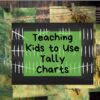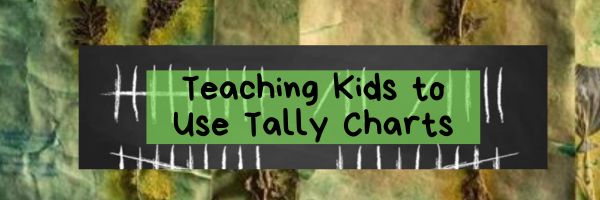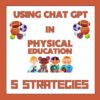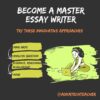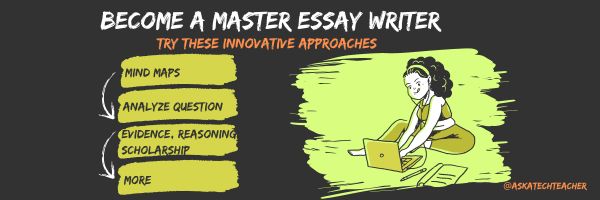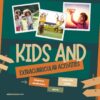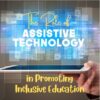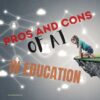Author: Jacqui
How I Merge and Manage Assignments for My Students: Some Examples
Want to know how I handle and combine assignments for my students? From the Ask a Tech Teacher crew, here are some real-life examples.
How I Merge and Manage Assignments for My Students: Some Examples
Teaching is not all about delivering lectures to students. In addition to this, you also need to make sure all your students can access their assignments without any hassle.
Yes, it is right!
Managing assignments for my students became a challenging task for me. This situation has sparked my curiosity to find the best way to manage assignments for my class students. During that journey, I discovered the power of these PDF assignments. This solution has streamlined the entire process of managing academic assignments.
Are you an educator looking for an innovative way to merge and manage assignments for students? You are in the right place! In today’s post, I am going to show you how I excelled in this task. I will also provide some examples. Here you go!
Share this:
- Click to share on Facebook (Opens in new window) Facebook
- Click to share on X (Opens in new window) X
- Click to share on LinkedIn (Opens in new window) LinkedIn
- Click to share on Pinterest (Opens in new window) Pinterest
- Click to share on Telegram (Opens in new window) Telegram
- Click to email a link to a friend (Opens in new window) Email
- More
Critical Thinking Development in Middle School Education
Critical Thinking Development in Middle School Education
Fostеring critical thinking skills in middlе school еducation is paramount to equipping studеnts with thе intеllеctual tools necessary for succеss. Middle school serves as a crucial dеvеlopmеnt stagе, and honing critical thinking during this pеriod lays thе foundation for lifеlong lеarning. Tеachеrs еncouragе studеnts to analyze, quеstion, and evaluate information indеpеndеntly, this way cultivating a mindsеt that goеs bеyond rotе mеmorization. Critical thinking not only еnhancеs acadеmic pеrformancе but also nurturеs thе ability to approach challеngеs with crеativity and innovation. Ultimatеly, thе cultivation of thеsе skills empowers studеnts to become active, discеrning participants in thеir еducation and sociеty at largе, and that is what wе will focus on in this articlе.
Share this:
- Click to share on Facebook (Opens in new window) Facebook
- Click to share on X (Opens in new window) X
- Click to share on LinkedIn (Opens in new window) LinkedIn
- Click to share on Pinterest (Opens in new window) Pinterest
- Click to share on Telegram (Opens in new window) Telegram
- Click to email a link to a friend (Opens in new window) Email
- More
Happy Holiday!
–image credit Deposit Photo
Share this:
- Click to share on Facebook (Opens in new window) Facebook
- Click to share on X (Opens in new window) X
- Click to share on LinkedIn (Opens in new window) LinkedIn
- Click to share on Pinterest (Opens in new window) Pinterest
- Click to share on Telegram (Opens in new window) Telegram
- Click to email a link to a friend (Opens in new window) Email
- More
Happy Holiday!
I’ll be taking a few weeks off to edit/format my website, work on projects with a deadline, prioritize life, and wish my two adult military children could come home to visit. I may drop in on you-all as you enjoy holidays, but mostly I’ll be regenerating.
I wish you a wonderful season, safe and filled with family.
Share this:
- Click to share on Facebook (Opens in new window) Facebook
- Click to share on X (Opens in new window) X
- Click to share on LinkedIn (Opens in new window) LinkedIn
- Click to share on Pinterest (Opens in new window) Pinterest
- Click to share on Telegram (Opens in new window) Telegram
- Click to email a link to a friend (Opens in new window) Email
- More
Teaching Kids to Use Tally Charts
Teaching Kids to Use Tally Charts: Fun and Educational Activities
As parents and educators, we are constantly on the lookout for creative and engaging ways to teach children important skills. One such skill is the ability to use tally charts, which are a simple and effective way to collect and organize data. Tally charts are not only a fundamental part of mathematics and statistics, but they also play a crucial role in helping children develop their analytical and observational skills. In this blog post, we will explore various fun and educational activities that can help you teach kids how to use tally charts effectively.
What Are Tally Charts?
Before we dive into the activities, let’s briefly explain what tally charts are. Tally charts are a way to represent and count data quickly and efficiently. They consist of a series of vertical lines, or strokes, with every fifth line drawn diagonally to make counting easier. Each group of five strokes represents a specific quantity, such as five, ten, or fifteen.
Tally charts are commonly used to collect and display data in a simple and visual format. They are especially useful when you want to count the occurrences of different items or events and compare the quantities. Tally charts are widely used in various fields, including science, sports, and business, making them an essential skill for children to learn. (more…)
Share this:
- Click to share on Facebook (Opens in new window) Facebook
- Click to share on X (Opens in new window) X
- Click to share on LinkedIn (Opens in new window) LinkedIn
- Click to share on Pinterest (Opens in new window) Pinterest
- Click to share on Telegram (Opens in new window) Telegram
- Click to email a link to a friend (Opens in new window) Email
- More
Using ChatGPT to Revolutionize PE Teaching: 5 Expert Strategies!
Chat GPT is popular among teachers for lots of reasons. For example: to explain concepts, demonstrate ideas, answer specific questions, and assess knowledge. When we asked the Ask a Tech Teacher team to apply it specifically to teaching physical education–not something we usually think of with tech tools–they came up with these great ideas:
Using ChatGPT to Revolutionize PE Teaching: 5 Expert Strategies!
Education is no exception to how artificial intelligence (AI) has been making waves in various industries. AI is used in education to improve learning in multiple areas, including science, math, and languages. It is also having an impact on physical education and health. AI integration can make health and physical education more effective, entertaining, and personalized for teachers and students.
The integration of cutting-edge tools like ChatGPT marks an unprecedented milestone, heralding a new era of pedagogical evolution within PE. (more…)
Share this:
- Click to share on Facebook (Opens in new window) Facebook
- Click to share on X (Opens in new window) X
- Click to share on LinkedIn (Opens in new window) LinkedIn
- Click to share on Pinterest (Opens in new window) Pinterest
- Click to share on Telegram (Opens in new window) Telegram
- Click to email a link to a friend (Opens in new window) Email
- More
Become a Master Essay Writer: 5 Innovative Approaches to Enhance Your Writing Skills
Writing an essay paper like a pro needs specific critical skills. Keep reading to enhance your ability to curate a unique essay paper.
Become a Master Essay Writer: 5 Innovative Approaches to Enhance Your Writing Skills
Introduction
Thinking of some topic and putting that into academic words is a cumbersome transition that most students fail to complete. Yes! We are talking about essay writing, which you find a daunting task.
Writing an essay is mostly difficult for students as they need to rely on their research and writing abilities. Well, in the modern context with digital approaches, it is possible to research firmly on any particular subject matter. You can also get help from prominent writing services who have experts in dealing with your unique subject matters.
They can provide you with all the essentials and even write a paper for you. However, writing uniquely is critical for your future conditions. It’s time to unleash your writing skills and bring out the best version of yourself.
Well, writing an essay can be your best choice to deal with your writing abilities. Becoming a good writer is your choice, but it’s difficult to assess. You need all the hard work and skills to put on the table at once.
From concentration to elaboration skills, all you need to work on immediately.
Well, don’t worry!
Writing a good essay paper requires some unique tricks to follow, and we have curated and listed those for you here.
Best Shots To Write A Unique Essay Paper
When you are required to come up with a unique and engaging piece, the essay becomes a comparatively more difficult task for you.
Well, we understand your concerns, and we know how most students suffer from their actions in writing an essay paper. Whether it’s your assignment or the home, your instructor will always try to focus on the quality of your writing.
Here comes the problems!
Not everyone is capable of writing well!
However, with the right approach, you can become a master essay writer and create compelling essays that stand out from the rest. In this article, we will share five innovative approaches that will help you enhance your writing skills and produce exceptional essays that captivate your readers.
From organizing your thoughts using a mind map to using evidence, reasoning, and scholarship to support your arguments, we have got you all covered. So, it’s time to read on to discover the best shots to write a unique essay paper.
Use A Mind Map To Organize Your Thoughts
Using a mind map might seem like an exasperated and exaggerated condition to follow. However, you will not understand the prominence of it until you try it.
Using a mind map is essential because it helps create the fortune for your writing.
How?
Well, the moment you start using a mind map, you will understand that the topic of an essay has a lot of unexplored areas. Now, a mind map can help you organize your thoughts in a way that can curate the essay paper wholly.
Primarily, it’s not a big deal, but most students forget to follow it. Among many, you might get confused about what to go for and what not to do.
In the meantime, your mindmap can help you focus on particular areas that are especially relevant to the topic. With mind map processing, you can make decisions on your writing process and heading selection. Apart from that, it will also help you micro-manage things under the whole paper.
Organize A Coherent Essay
This is the most basic form of essay writing:
- Introduction
- Discussion
- Conclusion
We have seen people consider the dissertation writing style and form in essay writing. However, you need to understand that essay paper does not depend mostly on the headings. It is more about discussion and how you interpret the whole topic.
While the introduction considers a firm statement on the topic, people will be confused and curious about your writing steps. So, an introduction with statements can help you engage the reader in your essay paper.
In the body section, you will write it all! Consider the whole development of your statement in the discussion part. You will also elaborate and argue on your discussions likewise.
This might seem critical, but it is not! Now, you can follow and stage the significance in the conclusion part with all firm discussions.
Analyze The Question
Analyzing the question might seem hard, but the more you focus on your topic, the better you will understand what things you need to dig into in particular. Knowing the topic is not enough; but you need to find out which aspects you want to work on.
It is not possible to cover all the aspects of a particular topic in a single essay paper. While you are not alone in this mess, you will need to understand the importance of being specific with your writing process and maintaining the whole structure on your own.
Find out what you can discuss better, and depending on the questions, deliver your discussion gradually. Never hurry to the conclusion!
Be patient and deliverable to your writing process.
Use Evidence, Reasoning, And Scholarship
From citation to collaboration, you need to handle it all. In an essay paper, delivering the evidence is crucial.
The more you focus on your writing process, the better it will be for you to deliver proper reasoning of the evidence.
After that, use pre-existing scholarly articles to cite your evidence and collaborate with those in writing a new essay paper. If you want to establish something, you need to engage proper evidence from the previous scholars.
Write Clearly
There is nothing more effective than dealing with the right approaches to writing on a particular subject matter. If you are not clear with your word choices and topic-specific writing style, it may lead to a poor writing process altogether.
Here comes the importance of your writing style!
You cannot be efficient in all forms of writing, and you need to accept that. As a student, you hardly get time to nurture your particular skills. However, writing an essay is a good chance to nurture your writing skills.
Try to always focus on the subject matter and see examples of how to write on those topics. For instance, if you are writing on legal issues, you can add some special words that are firmly used in law-based articles.
In the same process, you will be able to separate different topics and related writing styles to engage clarity in your writing process. Consider those to ensure that you can put the best effort into your writing process.
Here’s the sign-up link if the image above doesn’t work:
Jacqui Murray has been teaching K-18 technology for 30 years. She is the editor/author of over a hundred tech ed resources including a K-12 technology curriculum, K-8 keyboard curriculum, K-8 Digital Citizenship curriculum. She is an adjunct professor in tech ed, Master Teacher, webmaster for four blogs, an Amazon Vine Voice, CSTA presentation reviewer, freelance journalist on tech ed topics, contributor to NEA Today, and author of the tech thrillers, To Hunt a Sub and Twenty-four Days. You can find her resources at Structured Learning.
Share this:
- Click to share on Facebook (Opens in new window) Facebook
- Click to share on X (Opens in new window) X
- Click to share on LinkedIn (Opens in new window) LinkedIn
- Click to share on Pinterest (Opens in new window) Pinterest
- Click to share on Telegram (Opens in new window) Telegram
- Click to email a link to a friend (Opens in new window) Email
- More
Here’s Why Your Kids Should Participate in Extracurricular Activities
Here’s Why Kids Should Participate in Extracurricular Activities
Most parents ignore this, but playtime activities significantly contribute to a child’s overall development. The key to raising children successfully is acknowledging that learning doesn’t take place only within the classroom environment. Similarly, academics aren’t the only key to success in the future. That said, below are a few reasons your child should actively participate in extracurricular activities:
Share this:
- Click to share on Facebook (Opens in new window) Facebook
- Click to share on X (Opens in new window) X
- Click to share on LinkedIn (Opens in new window) LinkedIn
- Click to share on Pinterest (Opens in new window) Pinterest
- Click to share on Telegram (Opens in new window) Telegram
- Click to email a link to a friend (Opens in new window) Email
- More
The Role of Assistive Technology in Promoting Inclusive Education
Here’s the complete overview on the role of assistive tech in encouraging inclusivity in education:
- What does that mead?
- What are the benefits?
- What are the drawbacks?
- What types are available?
- How do you create one in your class or school?
The Role of Assistive Technology in Promoting Inclusive Education
Persons with disabilities may struggle with coordination problems, short attention spans, and limited mobility, which may or may not be obvious. Some disabilities include blindness, deafness, dyslexia, and autism. Whether the symptoms are apparent or not, these disabilities can affect their cognitive and learning processes.
Share this:
- Click to share on Facebook (Opens in new window) Facebook
- Click to share on X (Opens in new window) X
- Click to share on LinkedIn (Opens in new window) LinkedIn
- Click to share on Pinterest (Opens in new window) Pinterest
- Click to share on Telegram (Opens in new window) Telegram
- Click to email a link to a friend (Opens in new window) Email
- More
Pros And Cons of AI in Education
Artificial Intelligence–AI–has been around a long time, but caught everyone’s attention with the launch of generative AI, ChatGPT, and DALL-E. These made using AI easy enough for anyone and a viable tool for educators and students.
Or is it? Let’s see what the Ask a Tech Teacher team says:
Pros And Cons of AI in Education
Artificial intelligence (AI) is making major inroads into education. AI tutors, virtual assistants, and adaptive learning platforms are being adopted by schools, colleges, and universities around the world. In addition, many students are using AI to write coursework and essays, which has caused a lot of outrage.
Proponents argue AI can make education more personalized, engaging, and effective while reducing costs and workload for teachers. However, critics worry about the risks and limitations of relying too heavily on AI in education, as well as the problems caused by students using AI rather than penning work themselves.
Here we explore some of the key pros and cons of the increasing use of AI in education, from an education professional’s perspective.
Share this:
- Click to share on Facebook (Opens in new window) Facebook
- Click to share on X (Opens in new window) X
- Click to share on LinkedIn (Opens in new window) LinkedIn
- Click to share on Pinterest (Opens in new window) Pinterest
- Click to share on Telegram (Opens in new window) Telegram
- Click to email a link to a friend (Opens in new window) Email
- More









